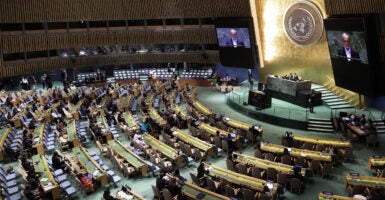It’s Climate Week at the United Nations in New York, and the U.N. General Assembly on Sunday voted to phase out fossil fuels, at the same time abandoning its sustainable development goals of eliminating poverty and hunger.
That’s because no nation has ever eliminated poverty and hunger without fossil fuels.
Vice President Kamala Harris hasn’t commented on phasing out fossil fuels, but President Joe Biden is all in favor.
On Monday, just after bragging about progress with the U.N.’s sustainable development goals before the General Assembly in New York, he said, “We’ve taken the most ambitious climate actions. We’ve moved to rejoin the 2015 Paris Agreement on Day One. And today, my country is finally on track to cut emissions in half by 2030 … .”
His goal is to decarbonize the electricity grid by 2035 and achieve net zero by 2050.
But those plans, if achieved, are incompatible with the U.N. sustainable development goals. Eliminating poverty is the first goal, while dealing with climate change is goal 13. After poverty elimination, in order, come zero hunger; good health and well-being; quality education; gender equality; clean water and sanitation; affordable and clean energy; decent work and economic growth; industry, innovation and infrastructure; and reduced inequalities.
All of those require affordable energy.
Modern industrialized societies have not only begun to demand affordable, reliable energy, but also to use it to operate everything from transportation and refrigeration to air conditioning and internet access.
Advanced societies use energy to diminish poverty, increase agricultural productivity, decrease child mortality, and allow the generation of wealth needed to address pollution concerns.
Conversely, lack of affordable and reliable energy is associated with a lack of access to clean water, adequate medical care, affordable transportation, and economic opportunities, all of which stall human advancement, especially in the most vulnerable countries.
Access to food requires fertilizer and refrigeration. A blackout for a small grocery store owner means a loss of refrigeration, which means some food either has to be sold at fire-sale prices or left to spoil.
Hospitals need energy, and in developed economies—and some emerging economies—many have backup generators.
Gender equality requires technology to power water systems and machines that do away with the drudgery of household labor, such as clothes washers and dryers, dishwashers, and vacuum cleaners. Even hair-dryers help women look their best while walking out to the coffee shop or to a job.
The Biden-Harris net zero agenda would result in a loss of at least $7.7 trillion in gross domestic product through 2040. Moreover, this income loss would come without any changes in global temperatures. Even completely eliminating all fossil fuels from the United States would result in less than 0.2 of a degree Celsius in temperature mitigation by the year 2100.
A 2023 Heritage Foundation report, “Powering Human Advancement,” shows that impoverished countries that use only about 500 kWh of energy per capita often have subsistence-level production and incomes of about $1,000 per year.
When energy consumption eclipses 10,000 kWh per capita, there is a drastic decline in poverty, with a virtual eradication at about 100,000 kWh per capita.
This relationship between economic development and energy use is so strong that there isn’t a single nation with a high per capita income and low per capita energy usage. Conversely, there isn’t a single country with high energy use per capita and low per capita income.
Climate change is a future risk to be managed, but poverty is today’s global problem. An estimated 3 billion to 6 billion people lack electricity or running water, and they can’t get them with renewables.
The U.N. General Assembly and the Biden-Harris administration should decide if they want to achieve their sustainable development goals of reducing poverty and hunger or if they want to eliminate fossil fuels.
They can’t do both.




























